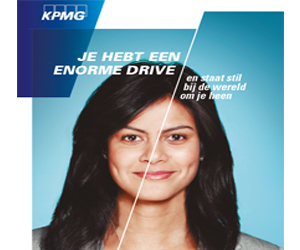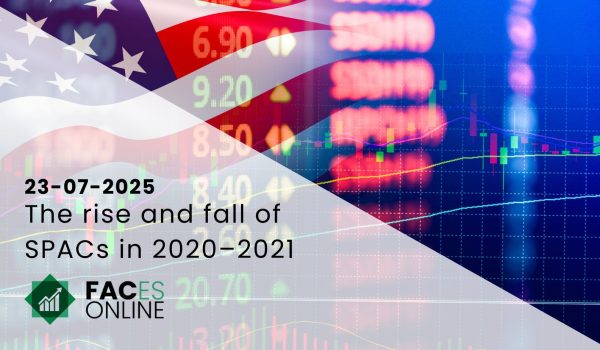In this interview Pieter de Boer, recruitment consultant at KMPG, tells us about the application process at KPMG. He gives us insight into the selection process, the preparation for an interview and the most important characteristics for an accountant.
Can you tell us something about yourself, your education and your career?
I have been working for KPMG as a recruitment consultant for one and a half years now. After high school in Alkmaar I studied Business Administration at the University of Groningen. Groningen seemed like a nice college town. This study suited me because it was fairly broad and I wasn’t yet sure what I wanted to become. During my studies I also worked for a study association. After my bachelor I completed the Master of Human Resources. It took me eighteen months due to my role on the Board of UniPartners. I wrote my thesis at briefopbestelling.nl; a company that sells resumes and cover letters. After my graduation I started at Randstad and worked there for over two years. I was responsible for recruiting candidates for banks; ING was our biggest customer. I also worked half a year at the DUO.
How did you end up at KPMG?
I was looking for recruitment functions in financial services because the branch appeals to me. When I came across a vacancy at KPMG, I decided to apply. I had a good experience with the company and also some friends of mine were already working there. I phoned them to inquire about the atmosphere and how their recruitment process works. From the phone calls I made, I had a good feeling and then I also had a positive interview. After two interviews they asked me if I wanted to work for the company. This is how I ended up at KPMG.
Why did you decided to work in Human Resources, recruitment?
After my bachelor I found that the aspect of working with people was very interesting for me. I think it is a challenge to select the most suitable candidates and the best people for a business. I very much like performing job interviews, giving advice, but also ensuring that KPMG is an attractive employer. Making sure that people want to apply with us. These are actually the two main things I like about the profession.
How do you deal with working within an accounting environment without having studied accounting?
I regularly meet clients to keep my knowledge up-to-date. I know a lot and also know what it is like to work as an accountant at KPMG. If you work in an audit, you will visit many different clients and need to adapt to a lot of hard work. I see the developments and I find that also very interesting to follow.
What is your function exactly and what does your average working day look like?
As a recruitment consultant at KPMG I have an advisory role towards the business. Half of the job involves selection and everything that comes with it. The other half consists of recruitment; the part that is actually making people apply with us. That means being visible at universities, social media, but also liaise with the education itself and organize activities. Recruitment and selection are my tasks. Every day is different. I try to schedule my days in an efficient way. Some days I only do interviews and other days I consult with colleagues and have several activities with student associations. It may also have one or two evenings a week that I have an activity to attend to. So, you can have pretty long days, which is sometimes tough, but also fun.
How does the process of recruitment work in general?
The process before the job application is different and depends on the situation. But the application process in general is the same for different offices. The process often starts with a C.V. and a motivation letter. Before the job interview you have to pass a capacity test and a personality test. The job interview consist of two interviews, the first interview is with a recruiter and sometimes with a consultant or auditor. The second interview is with two managers of the office. If you get through these two interviews you will probably get a job offer.
When you receive 1000 C.V.’s, based on what criteria do you select by?
Firstly, I will ask myself why I receive 1000 C.V.’s, maybe there is something wrong with the profile description. But when I receive that many C.V.’s a selection has to be made. I look at their study progress and what specific study someone did. It is important to see how long someone has taken to complete his or her study and the specific path they took. Furthermore, it is important what someone has done in addition to his or her study, for example; exchange, commissions, board and work. So, in the case of 1000 C.V.s selection is based on hard criteria. When I receive less C.V.’s there is sometimes a use of LinkedIn, but I do not support this very much.
What are the main characteristics a future colleague should have?
For a job at an organization like KPMG, certain features of interest are important. The most important ones are; being proactive, a team player and ambition. Being proactive is important for your own development. Because people in the office do not come to you with all the possibilities you have, but you will have to take initiative by yourself. Team work ethic is another important feature because most things you do are with a team. If you work as an auditor, you are often working in teams with a client. So, to succeed at this job it is important that you can work well in teams. Being ambitious is important because you have to continue to progress and this will help in getting a promotion. There are a lot more skills that are important, but in my opinion these three are the most crucial.
How important are assessment during the selection process?
As mentioned before there are two tests you will have to take. But in the selection process there is a difference between these two tests. The capacity test is the most important one, because this measures one’s abilities. Someone’s abilities have the highest predictive value for performance; this is the best indicator to choose someone for a job. During the first interview it may be that you have to make a few capacity test questions to ensure the reliability. The personality test is less significant, because the predicted value is lower. The results of the personality test are especially important as input for an interview.
How can you prepare best for the first interview? What in particular is most important to ensure a successful interview?
It is important to be prepared for the interview, especially knowing the function, the office and your interviewer is important. You will have to answer questions such as; why do you want this, why is this sector of most interest, why Big 4? It is also important to know your C.V., you will have to explain the choices you made. Also one should be aware of your first impression, this is something you cannot change once you have made it.
There are also a lot of things you should not do during an interview. Here are a few examples; never talk negative about your previous employers; never ask challenging questions and do not arrive late without any reason.
What advice would you like to give to our students?
Orientate yourself as early as possible! When you graduate, you know what is out there and companies get to know you. Go to as many activities as possible that are organized by associations and companies for a broad orientation. And be critical, you have to make a choice that is best for you. A broad perspective makes it easier to make the right decision. Some additional advice from me, become an active member of the study association. This is no guarantee but it is very good for your personal development.

















